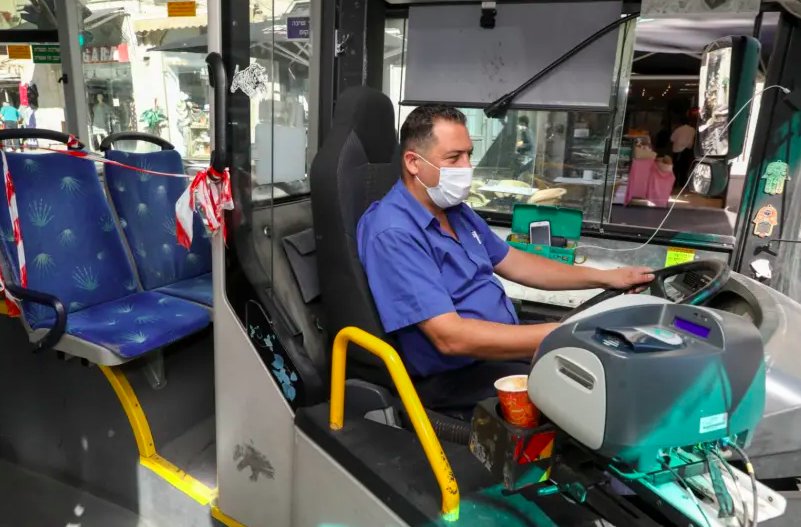Bus drivers plan strike starting Wednesday: 'Drivers aren't worthless'

Public transportation companies in Israel are threatening to begin a general strike on Wednesday, as bus drivers feel that they are not being properly protected amid the coronavirus pandemic.
As part of coronavirus regulations, public transportation users are not allowed to pay for tickets with cash and must instead use a Rav-Kav transportation card. An exception was recently made for the elderly and those who live in settlements, but bus drivers feel that they are being put at risk by having to accept cash payments.
Companies under the Bus Drivers Union will take part in the strike, including Kaviim, Dan, Afikim, Superbus, Netiv Express, Dan North, Dan South and Egged Taavurah (Transport), a subsidiary of Egged Public Transportation Company. The union is a member of the Israel National Labor Federation.
"The Transportation Ministry is leading the public transportation industry into a real failure," said the Bus Drivers Union on Sunday, according to Maariv, sister publication of The Jerusalem Post. "Bus drivers are people, too, and have the right to observance of their health rules under the Purple Ribbon. Bus drivers are not worthless – and whoever forgets this will understand well during the general strike planned for Wednesday."
On Monday, the chairman of the Israel National Labor Federation, Yoav Simhi, asked Prime Minister Benjamin Netanyahu, Health Minister Yuli Edelstein and coronavirus project manager Prof. Ronni Gamzu to order an end to cash payments on buses, according to Calcalist.
Simhi stressed in a letter to the three that while over a thousand bus drivers have been infected with the coronavirus and hundreds are in quarantine, the state "refuses to implement all necessary measures to maintain the safety of drivers and passengers."
A labor court in Nazareth ruled on Monday that the Superbus Company must cancel all fines issued against drivers who did not accept cash payments on buses and that no more such fines could be issued.
Earlier this month, Transportation Minister Miri Regev told Ynet that she is conducting negotiations with the Finance Ministry to allow elderly people to use public transportation for free amid a refusal by bus drivers to accept cash payment for tickets due to the coronavirus outbreak.
"Just like we pay at the supermarket and banks with cash, so too, elderly people who don't have a Rav Kav will pay with cash. Meanwhile, we will protect the drivers, of course – we are rushing and increasing the partitions that will be in each bus," said Regev.
While the government has promised in recent months to install partitions around the driver's seat on buses, most buses remain without such partitions. Passengers are forbidden from sitting in the first row behind the driver's seat.
The union has been warning about the dangers posed to bus drivers in recent months, and has called on the government to do more to protect drivers.
"The scenario of horrors we warned about throughout the coronavirus crisis is coming to fruition with the release of worrying data from verified patients on public transport," warned Bus Drivers Union chairman Yisrael Ganon at a Knesset committee meeting in June.
Ganon demanded at the time that the Health Ministry immediately limit the number of travelers allowed on buses, increase the number of ushers and security guards and close the front doors of buses until barriers are installed for drivers.
"Every driver that is infected could infect thousands of passengers per day until he enters quarantine," added Ganon. "We won't agree at any price to risk the lives of drivers and passengers. Buses have turned into an actual ticking time bomb. It's time to stop abandoning drivers and passengers."
According to coronavirus regulations issued earlier this month, buses can travel at about 50% capacity, with the number of passengers limited on city buses to 30, on intercity lines to 32 and on elongated buses to 50. Passengers are required to wear masks over their mouth and nose.
